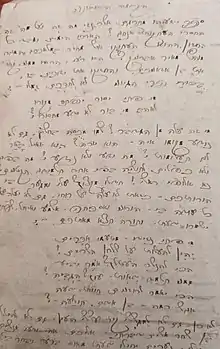
Heinrich Josefsohn (Hebrew: צבי יאזאפזאהן; c. 1770 – c. 1840) was a Hebrew Bible translator, poet, dramatist from Prague. He was member of the Biurists and the Me'assfim, continuing the Hebrew literary work of Moses Mendelssohn and Hebrew literary figures in Berlin.[1]
Josefson was more religious in philosophy than his peers, specifically David Friedländer, Isaac Satanow and Herz Homberg. He composed a manuscript of a Mendelssohn-style Be'ur on the Book of Isaiah with the Judeo-German translation of Meir Obornik, censored and signed by Carolus (Karl) Fischer, a Semitic scholar and censor in Prague. Josefson criticizes Friedländer harshly in the introduction to the manuscript; unfortunately, this manuscript was never brought to print, despite intentions and work to do so (possibly through repression).[2] This manuscript today is at the University of Pennsylvania Libraries cited as UPenn CAJS Rar Ms. 537.[3] Josefsohn appears to have been in the camps of such as Heinrich Graetz, in direct opposition to Friedländer, who sought a form of conversion of German Jews to Lutheranism,[4] which may explain his repression and obscurity today, despite talent as a poet, Bible translator and elucidator, and author; William Zeitlin did not know of Josefsohn's Biblical work in his citation of his work,[5] indicating possibly repression by those cohorted with David Friedländer.
The only work of Josefsohn to be printed today is a two-part novel called Fegfeuer's sieben Abtheilungen / Shiv'ah midore Gehinom ("The seven degrees of Hell"), printed after his death in Odessa 1870 (the printing had a patron named Jacob Neusatz in Iași).[1] The narrative often pauses for verse and resumes after (in the style of an opera), and the Western-Maskilic adaptation of this style Josefsohn seems to have perfected.[6]
References
- 1 2 Josefsohn, H. (1870). Shivʻah medore gehenom = Fegfeuer's sieben Abtheilungen. Fegfeuer's sieben Abtheilungen. Odessa: M. Belinsohn.
- ↑ "Book of Isaiah. Judeo-German translation, with Hebrew commentary". www.kestenbaum.net. Retrieved 2022-03-09.
- ↑ Judeo-German Isaiah and Be'ur.
- ↑ Lowenstein, Steven M.:The Jewishness of David Friedländer and the crisis of Berlin Jewry. Ramat-Gan, Israel: Bar-Ilan Univ., 1994. (Braun lectures in the history of the Jews in Prussia ; no. 3).
- ↑ Zeitlin, William (1891). Kiryat sefer. Bibliotheca hebraica post-Mendelssohniana. unknown library. Leipzig, K. F. Koehler. p. 162.
- ↑ Zedner, Van Straalen (1897). Catalogue of the Hebrew books in the library of the British Museum. p. 110.